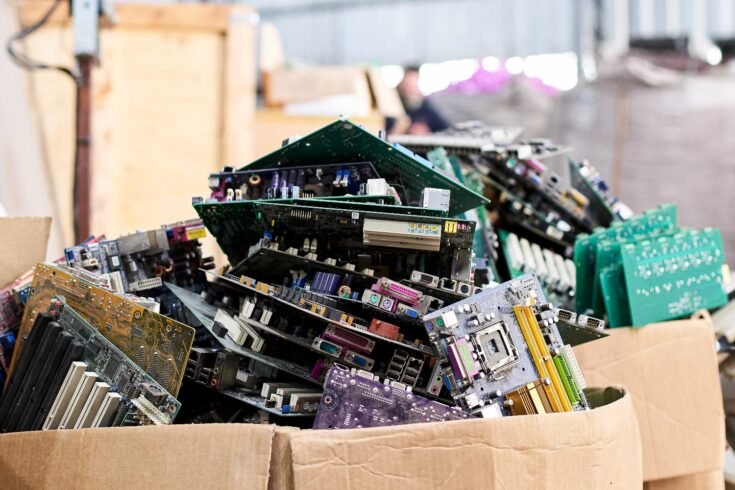The challenge of electronic waste
From mobile phones to computers to wearable devices, electronics and technology are changing the way we live. These sectors are growing rapidly, and the pandemic has only accelerated this, with a growing reliance on technology to stay connected. An increase in demand for more functionality, comes with an increased reliance on critical materials and in items being disposed of, generating huge amounts of waste in the process.
It was estimated in 2019 that digital technologies were responsible for 4% of greenhouse gas emissions – equivalent to the emissions of the entire aviation industry.
Accelerating change
Sustainability is key if we are to advance in this area. We must tackle growing challenges, such as e-waste and a reliance on imported components and materials, by moving towards a more circular economy; coming up with solutions to ensure products and materials are designed to be reused, repaired, remanufactured and recycled, and kept in circulation for as long as possible at their highest value, until end of life.
The UK can build on existing broader expertise in the development of a circular economy. An investment of £30 million into the four-year National Interdisciplinary Circular Economy Research (NICER) programme is already helping move the UK towards a resilient circular economy. It is the largest and most comprehensive investment in the UK circular economy to date.
Driving a broader circular economy
Digital technologies, from robotics, to automation, to data science, have the potential to accelerate a broader transition to a circular economy and a more sustainable future. From helping drive positive behavioural change, to improving business models, digital solutions can help tackle some of societies biggest challenges. This includes helping to reduce plastic waste, enabling battery recycling, and allowing product information to be tracked and monitored throughout its lifecycle, keeping it in circulation for longer.
That said, the potential environmental cost is high, with digital technologies responsible for significant resource depletion; 2018 estimates suggest digital technologies alone could account for approximately 21% of all electricity demand by 2030. The need to find solutions which improve the sustainability of such digital technologies is now therefore becoming critical. Collaborative research efforts are needed between our communities to understand and develop high performing materials that tackle our dependency on endangered materials, ensuring the design of our future information and communication technologies (ICT) builds on materials that are efficient and sustainable, as well as functional.
Hence, UK Research and Innovation (UKRI) wants to take a more systemic approach and improve both the sustainability of digital technologies and enable application of digital technologies to drive towards a more sustainable and circular future.
Drawing together our world class circular economy, ICT and materials science and engineering communities with key stakeholders, offers the potential to drive development of interdisciplinary research and innovation vital to the transition to a digital circular economy.
Funding opportunity
EPSRC has an open funding opportunity for collaborative research that contributes to the development of a digitally enabled circular economy and more sustainable digital technologies. This can include software, hardware and combined technologies.
Through this funding opportunity, we are looking to invest in two interlinked areas of research:
- sustainable ICT
- digitally enabled circular economy
Proposed research may integrate the two areas into one research programme.
Grants awarded under this funding opportunity will form part of a broader investment to build connections and research capacity in this area.
A network funding opportunity will launch later in 2023.



